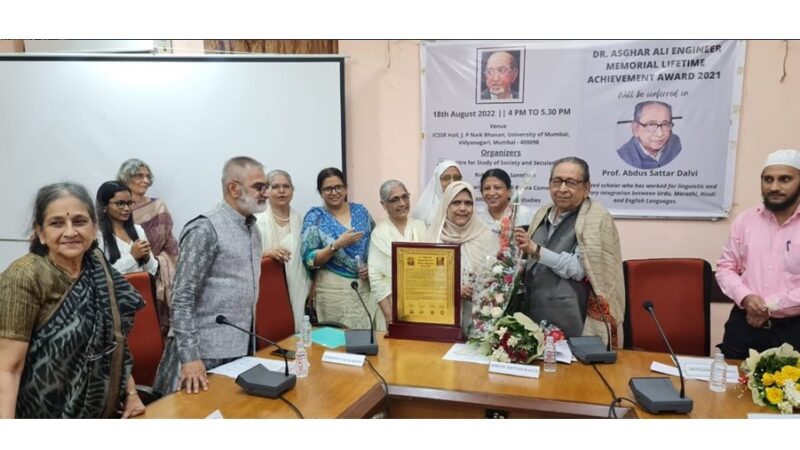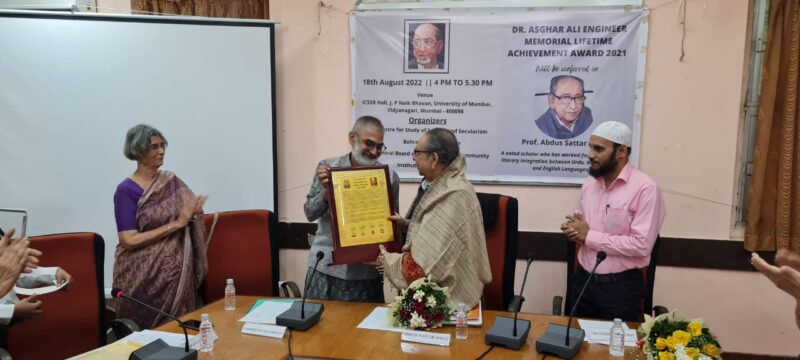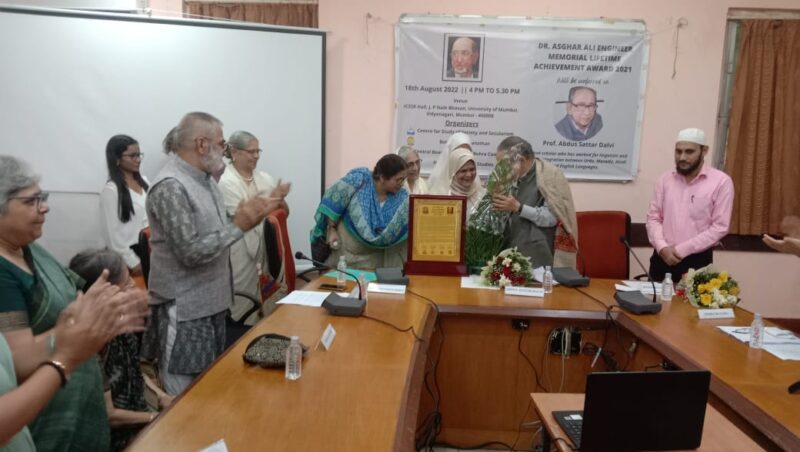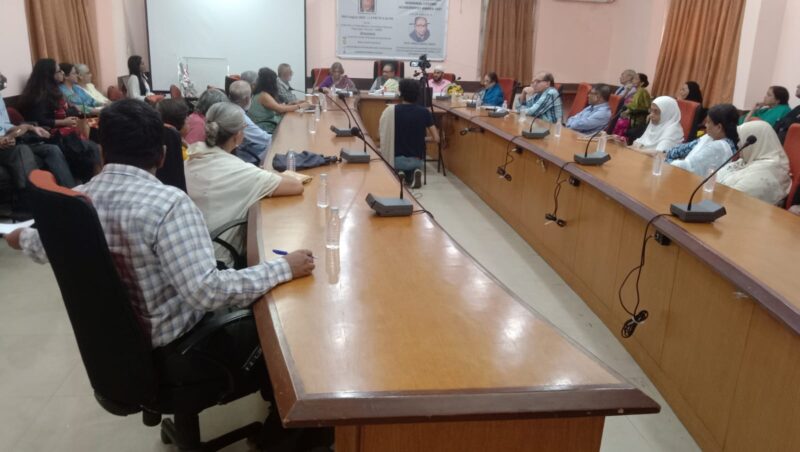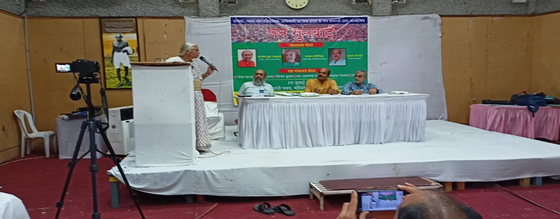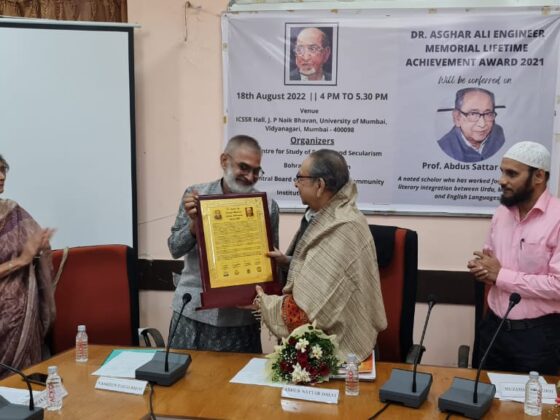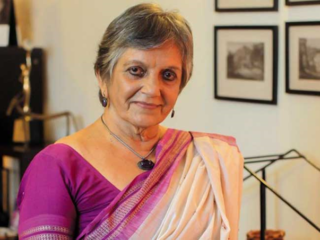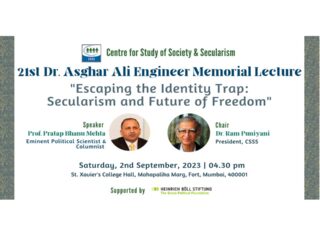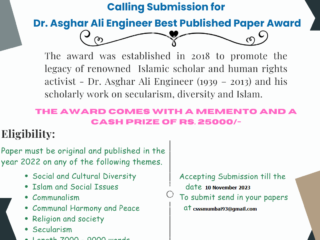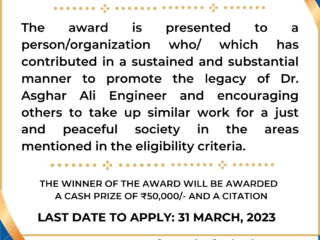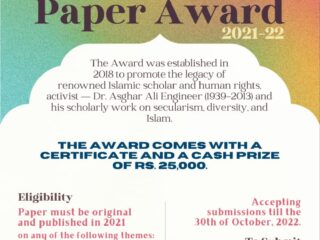“Prof. Abdus Sattar Dalvi has contributed significantly in bringing the Urdu speaking and Marathi speaking communities closer by translating Marathi literary gems into Urdu. Especially by translating the works of Marathi saint poets, Prof. Dalvi has promoted better understanding and peaceful co-existence between different communities”, said Prof. Indra Munshi, former head of department of Sociology at Mumbai University and a reputed scholar.
Prof. Indra Munshi was speaking at the event to confer the Dr. Asghar Ali Engineer Memorial Lifetime Achievement Award, 2021 on 18th August at the ICSSR Conference Hall at the JP Naik Bhavan in Mumbai University. The conferment ceremony was organized by Centre for Study of Society and Secularism (CSSS). Irfan Engineer, Director of CSSS presented the prestigious Award to Prof. Dalvi, a scholar who has translated many iconic works of literature and won many accolades for the same. The Award is instituted by Central Board of Dawoodi Bohra Community, Institute of Islamic Studies, Bohra Youth Sansthan and Centre for Study of Society and Secularism jointly. It carries a cash prize of INR 25,000 which was presented to Prof. Dalvi along with a citation which was read out by Irfan Engineer.
Prof. Dalvi had an illustrious career spanning over five decades. He was the founding head of the Urdu department at the Mumbai University. He was the head of the department and the Professor Krishna Chandra Chair from 1982 to 1997.
Prof. Dalvi has translated important Hindi, Marathi and English literary works into Urdu. Due to his translations, these literary gems became accessible to more readers across religious and linguistic barriers and thereby gave an opportunity to have better understanding of shared culture in India. He has translated Marathi works such as classic Marathi poem “Manache Shlok” by Saint Poet Ramdas and “Pasayadan” composed by the famous Marathi Saint Poet Dnyaneshwar into Urdu. He translated three Marathi novels: Savitri and Avalokita written by P. S. Rege and Ranangan by Vishram Bedekar into Urdu. The last one got him Sahitya Akademi’s Prestigious Translation Prize in 1990. He also translated “Edinburgh – Interlude” (Zikr-e-Edinburgh) by famous Indian English poet Nissim Ezekiel into Urdu, which was widely acclaimed by the scholarly world. He edited and introduced Tulsidasa’s Brajbhasha (Hindi) poetry to the Urdu world.
He is a recipient of numerous awards, which include the prestigious Ghalib Award of the Ghalib Academy, Delhi; Sant Dnyaneshwar Award of the Maharashtra State Urdu Academy; Maulana Abul Kalam Azad Award of the Uttar Pradesh Urdu Academy; Rajasthan Urdu Academy Award and West Bengal Urdu Academy Award.
Assistant Prof. Muzzamil Sirkhot working at the Urdu department of Mumbai University while speaking about Prof. Dalvi said, “the way Dr. Asghar Ali Engineer dedicated his life for communal harmony, in the same way, Prof. Dalvi through his work has brought different linguistic communities closer and thereby strengthened communal harmony. He didn’t restrict his translations to Marathi and Urdu literature but only translated works from English, Kannada, Gujarati and Sanskrit languages. More importantly, Prof. Dalvi inspired by the thoughts of Mahatma Gandhi has tried to establish peace and communal harmony in his own way”.
While accepting the Award, Prof. Dalvi said, ” I accept this Award with utmost humility. This Award is a step towards recognising the instrumental role played by Urdu language in the conservation of shared culture and valuable literary work produced in India.”
Prof. Dalvi read out his Urdu translation of saint Dnyaneshwar’s ‘Pasayadan’. Clearly moved with the beauty of the ‘Pasayadan’, Irfan Engineer noted that some verses of the ‘Pasayadan’ and the Quran sound familiar. He observed that though the ‘Pasayadan’ and the Quran are in different languages, their central message and values are the same.
Over 70 persons attended this programme. Prominent activist and advocate for the rights of women, Flavia Agnes and former Rajya Sabha Member of Parliament, Hussain Dalwai were amongst those present in this programme. One of the persons from the audience asked Prof. Dalvi about the role of Muslims in the rise of Maratha Empire built by Shivaji or whether he would like to shed light on this through his writings. Prof. Dalvi responded that though he hasn’t studied this area very closely but there are records of poets like Sheikh Mohammad and few other poets who had composed poetry in both Urdu and Marathi languages during the reign of Shivaji. In that era, the language was not called as Urdu but as Hindustani. Besides when Niccolao Manucci, an Italian traveller came to Maharashtra during his stay in India, he met Shivaji at his court. The interaction between them took place in Persian and Hindustani. This indicates the use of Urdu language dates long back and it was prominently prevalent in Indian society. Shivaji in fact appointed a committee to compile a dictionary of Urdu called “Rajya Vyavhar”. Thus, under Shivaji’s instruction, the first dictionary of Urdu was compiled. These facts, highlighted Prof. Dalvi, indicate that the stereotype that is widely prevalent today that Urdu is a language only of the Muslim society is incorrect.
Dr. Asghar Ali Engineer was an Islamic scholar of international repute. He was the founding Chairperson of Centre for Study of Society and Secularism. His contribution to the area of communal harmony is pioneering. He has written numerous significant and insightful fact-finding reports investigating into communal riots. He was one of the most instrumental reformers in the Bohra community. He was also a strong advocate of gender equality and rights of Muslim women in Quran. He was awarded the prestigious Right to Livelihood Award amongst others. The Dr. Asghar Ali Engineer Memorial Lifetime Achievement Award was instituted to promote and recognise contributions in the above areas which were important to Dr. Asghar Ali Engineer.
In 2019, this Award was presented to K. P Ramanunni and in 2020 it was awarded to Justice Suresh posthumously for their contribution to communal harmony and peaceful co-existence in India.

